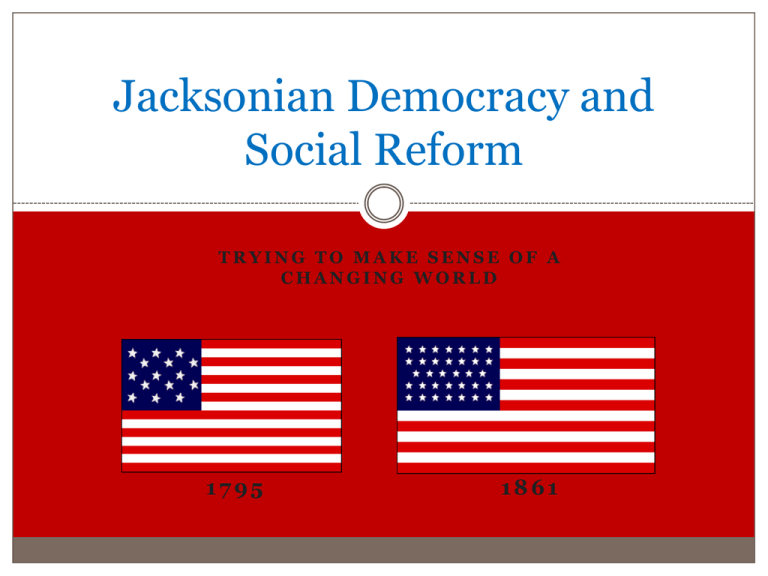Jacksonian Democracy and Social Reform
advertisement

Jacksonian Democracy and Social Reform TRYING TO MAKE SENSE OF A CHANGING WORLD 1795 1861 President Andrew Jackson Andrew Jackson won the Presidency in 1828 With his status as a war hero and a “common man” become popular with less elite individuals. He was born relatively poor and did not receive a first class education. Became known as “Old Hickory” for his stubbornness and refusal to bend to opposition. Universal Suffrage As a “common man” Jackson took issue with the typical upper class politician The founding fathers decided that only white males with land should vote. Landed white males would elect Congressman to the House of Rep. and then they would select the Senate and Electoral College. This is gov’t as a republic Jackson felt that all white males should have suffrage to elect people more representative of the “common folk” This represents a shift towards a more democratic idea of gov’t. The Second Great Awakening In addition to gov’t reforms the 1800’s sees many social reforms Many are sparked by a second nationwide revival movement The Second Great Awakening Traveling preachers and large “camp meetings” made people want to make the world a better place through Christian ideals They start a Reform Era Let us READ! The Reform Era The Temperance Movement Temperance means “moderation” Activists involved in the Temperance Movement wanted to eliminate or lessen the use of alcoholic beverages They wrote of the “evils of alcohol” They linked alcohol use to sickness, poverty, crime, and the breakup of families The Reform Era Education Reform Another area of focus for reformers was the education system In the 1800s not all children attended school Those “common schools” that were available free to the public focused on teaching the three basic “Rs” “Reading, Writing, and Arithmetic” Reformers felt that a better educated person made better decisions Widespread education is vital to democratic society The Reform Era Prison Reform Prisons in the 1800s tended to be inhumane places Prisoners were often held in overcrowded and unsanitary conditions Mentally ill prisoners could be held with no treatment in what we would call torture devices to isolate them from their surroundings Dorothea Dix wrote an exposé and gave speeches about these conditions after she visited a jail in Massachusetts She and her supporters ushered in an age of prison reform in Massachusetts and other states in the union The Reform Era Transcendentalism A new philosphical outlook also develops in New England during this time. Transcendentalism is the belief that knowledge is not found only by observation but also through reason, intuition, and personal spiritual experiences. Key transcendentalists of the period were Ralph Waldo Emerson and Henry David Thoreau Urban Reform With industrialization and immigration the country begins experiencing urbanization This leads to very crowed cities throughout the north Due to the crowding living conditions in many places deteriorate rapidly Tenements became the most common home for many working poor families Urban Reform Conditions were severely crowded and unsanitary Some reform efforts begin that establish health boards in some cities, but conditions stay bad for most of the 19th century We also begin to see urban workers come together to form labor unions Unions were often seen as anti-industry and nearly terroristic in nature. While mostly unsuccessful we do see the beginning of a limited 10 hour work day for some jobs. Women’s Rights Seneca Falls Convention in Seneca Falls NY 1848 Organized by Elizabeth Cady Stanton, who would later work with Susan B. Anthony, and Lucretia Mott the convention Created the Declaration of Sentiments This document, signed by a mix of 100 woman and men laid out what they felt the most grievous injustices against women were. Chief amongst their concerns was the fact that women could not vote or hold public office. While not achieving much directly the convention is a launching point for women’s rights activists for years to come. Abolitionism The rise of an abolition movement shows a changing perspective on slavery Efforts in the south were often focused on helping slaves escape The Underground Railroad, with people like Harriet Tubman, was a network of individuals who focused on getting slaves out of the South In the North speakers and writers formed anti-slavery leagues and tried to influence political direction While many abolitionists in the North were middleclass white Christians, many were former slaves. Frederick Douglas, born into slavery, became one of the most famous and influential abolitionist speakers of the time.



